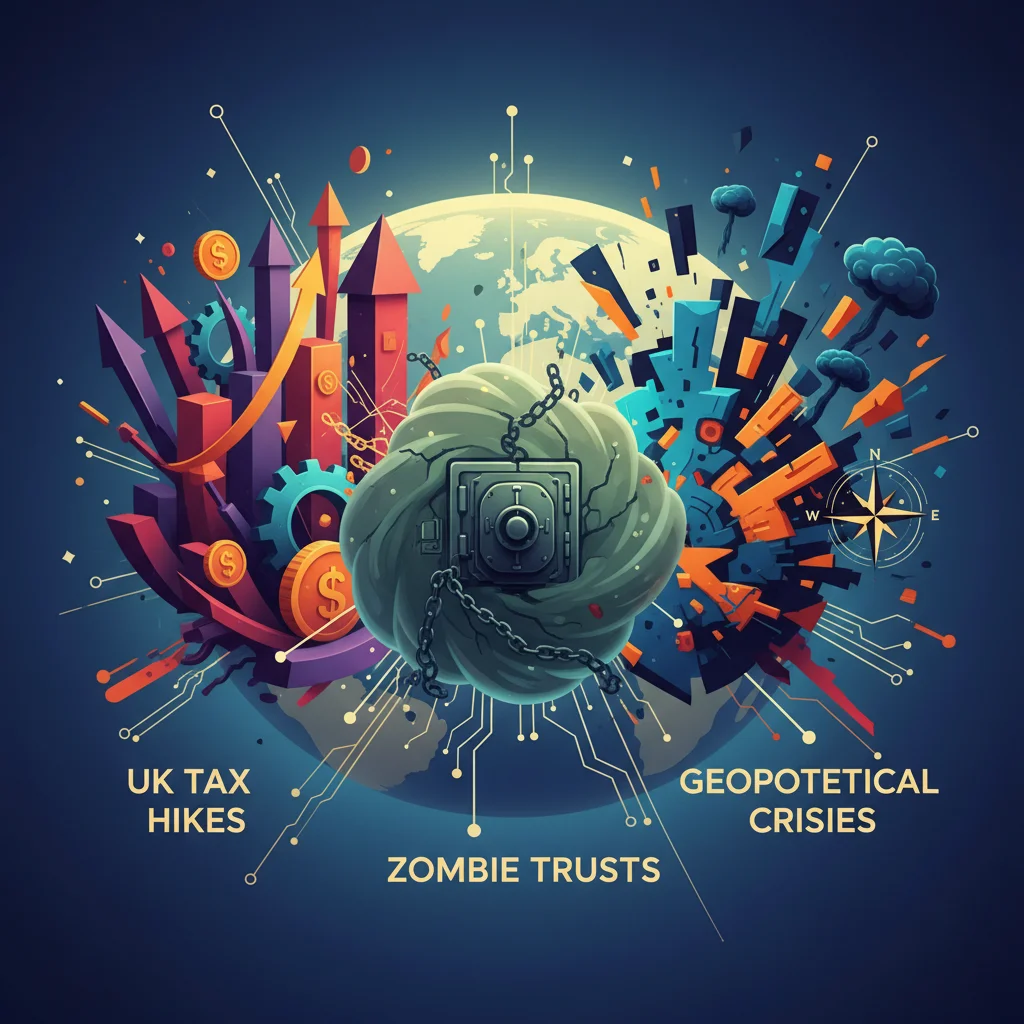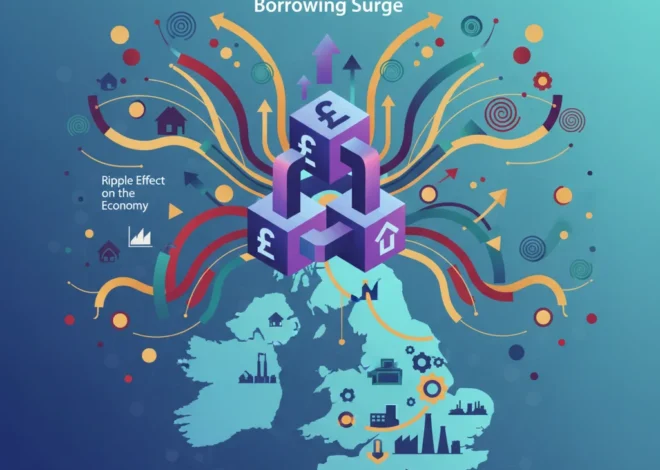
A Triple Threat to Global Stability: Decoding UK Tax Hikes, “Zombie Trusts,” and Geopolitical Crises
In today’s interconnected world, the ripples from a single political announcement, a hidden financial anomaly, or a distant humanitarian crisis can rapidly converge into a tidal wave of economic uncertainty. For investors, finance professionals, and business leaders, navigating this landscape requires more than just an eye on the stock market; it demands a deep understanding of the intricate ties between politics, esoteric financial structures, and global stability. A recent Financial Times newsletter perfectly encapsulates this complexity, highlighting three seemingly disparate yet profoundly linked stories: potential tax rises in the UK under a new government, the curious case of Liechtenstein’s “zombie trusts,” and the devastating famine in Sudan.
This article delves into each of these critical developments, moving beyond the headlines to provide an expert analysis of their implications. We will explore how a potential shift in UK fiscal policy could reshape the investment climate, uncover the risks lurking within arcane corners of the wealth management world, and examine the stark economic consequences of a humanitarian catastrophe. By connecting these dots, we can better prepare for the challenges and opportunities that lie ahead in our volatile global economy.
The UK’s Economic Crossroads: Starmer’s Shadow and a Shifting Tax Landscape
The United Kingdom’s economy is standing at a pivotal juncture. Grappling with the long-term effects of Brexit, stubborn inflation, and sluggish growth, the nation is also on the cusp of a potential political sea change. All eyes are on Labour leader Keir Starmer, who is widely expected to be the next Prime Minister. His recent comments, however subtle, have sent a clear signal to the markets: the era of rock-bottom taxes may be drawing to a close.
While Starmer’s Labour party has been careful not to reveal a detailed tax plan, insiders and analysts predict a focus on wealth and capital rather than broad-based income tax hikes for the majority of workers. The goal would be to raise substantial funds for beleaguered public services like the NHS without alienating the general electorate. This strategy, however, places investors, high-net-worth individuals, and corporations directly in the crosshairs.
Potential targets could include reforms to capital gains tax, adjustments to inheritance tax, or the removal of tax advantages for non-domiciled residents. For the stock market, the implications are significant. A higher capital gains tax could dampen trading activity and reduce the appeal of equity investments, potentially leading to a sell-off in certain sectors. For international investors, London’s appeal as a premier financial hub could be tested if the tax environment becomes less favorable compared to rivals like Paris, Frankfurt, or even New York.
To better understand the potential policy divergence, consider the following comparison of a few key areas:
| Taxation Area | Current Conservative Stance (General) | Potential Labour Approach (Speculative) |
|---|---|---|
| Corporation Tax | Raised to 25% but with a stated ambition to remain competitive. | Likely to maintain or increase the current rate to fund public spending. |
| Capital Gains Tax (CGT) | Rates of 10% (basic) and 20% (higher) for most assets. | Potential alignment with income tax rates (up to 45%), significantly increasing the tax on investment profits. |
| Non-Domiciled Status | Current favorable tax regime, though recently reformed. | Pledged to abolish the current “non-dom” regime and replace it with a modern scheme for temporary residents. |
| Inheritance Tax (IHT) | 40% rate above a £325,000 threshold, with various exemptions. | Could see a simplification of rules and the closing of loopholes, potentially increasing the overall tax take. |
This potential fiscal tightening represents a classic economics dilemma. On one hand, increased tax revenue is desperately needed to repair public finances and improve services, which can, in the long run, create a more stable and productive economy. On the other, higher taxes on capital and investment can deter the very activity needed to spur economic growth. The final policy choices will have a profound impact on everything from individual investing strategies to large-scale corporate financial planning.
The Milei Tsunami: How Argentina's Election Unleashed a Global Market Shockwave
The Ghosts of Finance: Unearthing Liechtenstein’s “Zombie Trusts”
Far from the public theater of UK politics, a quieter but equally complex issue is unfolding in the discreet banking halls of Liechtenstein. The principality, long known as a haven for private wealth management, is grappling with a peculiar problem: the rise of “zombie trusts.” These are not creatures from a horror film, but dormant, often ancient, legal structures that have outlived their original purpose and creators, becoming financial specters haunting the banking system.
A trust is a legal arrangement where a person (the settlor) gives assets to a trustee to hold for the benefit of others (the beneficiaries). For decades, Liechtenstein has been a jurisdiction of choice for setting up these structures due to its strong privacy laws and stable legal framework. However, as generations pass, the original purpose of many trusts has become obsolete, the beneficiaries untraceable, or the documentation lost to time. Financial institutions are now left as custodians of these zombie accounts, which hold assets but have no clear instructions or living beneficiaries to direct them.
This phenomenon poses several significant risks to the modern financial ecosystem:
- Compliance Nightmares: In an age of stringent anti-money laundering (AML) and know-your-customer (KYC) regulations, these trusts are a massive compliance headache. Banks are legally obligated to understand the source and destination of funds, an impossible task for an account with no discernible owner.
- Operational Drain: Maintaining these accounts costs money. Financial institutions must dedicate resources to manage, report on, and attempt to resolve these dormant structures, draining resources that could be used for productive banking activities.
- Systemic Risk: While individually small, the aggregate value of assets locked in such trusts could be substantial, representing “dead capital” that is removed from the active economy. They create a legal and financial fog that regulators and tax authorities find difficult to penetrate.
Interestingly, this old-world problem may find a solution in new-world financial technology. The rise of fintech and blockchain offers a potential path forward. Smart contracts on a blockchain could, in theory, create “immortal” trusts with rules encoded directly into them, automatically executing distributions or adapting to changing circumstances without human ambiguity. Distributed ledger technology could provide an unchangeable, transparent record of beneficiaries and assets, preventing the very decay of information that creates zombie trusts. While not a solution for the current problem, it highlights how financial technology is poised to revolutionize even the most traditional corners of finance and wealth management.
The Catacombs of Capital: Unearthing Ancient Lessons for Modern Finance
The Unseen Economic Toll: Famine in Sudan and its Global Ripple Effect
The third story, and by far the most tragic, is the escalating famine in Sudan. While the immediate focus is rightly on the immense human suffering, it is crucial for those in finance and business to understand the profound and far-reaching economic consequences of such a catastrophe. The situation in Sudan is a stark reminder that geopolitical and humanitarian stability are fundamental pillars of the global economy.
The direct economic impact on Sudan is total devastation. The collapse of agriculture, the destruction of infrastructure, and the displacement of millions have erased decades of economic development. But the ripple effects extend far beyond its borders. International aid organizations report that millions are on the brink of starvation, an event that will trigger a series of economic shockwaves:
- Supply Chain Disruption: Sudan is a major global producer of specific commodities, most notably gum arabic, an essential ingredient in everything from soft drinks to pharmaceuticals. The conflict has crippled its production and export, causing price spikes and forcing global manufacturers to scramble for alternatives.
- Regional Destabilization: The crisis is spilling into neighboring countries like Chad and South Sudan, which are already economically fragile. The massive influx of refugees strains their resources, threatens their political stability, and disrupts crucial cross-border trade, creating a contagion of economic distress.
- Global Financial Strain: Responding to a famine of this scale requires billions of dollars in international aid. This financial commitment diverts funds from other development projects and puts pressure on the budgets of donor nations, which are already dealing with their own domestic economic challenges.
- Investor Risk and Confidence: A major humanitarian crisis in a strategically important region like the Horn of Africa elevates the overall risk profile for the continent. It can deter foreign direct investment, increase insurance premiums for shipping and trade, and create a perception of instability that frightens away capital from otherwise promising emerging markets.
For the modern investor, this underscores the growing importance of Environmental, Social, and Governance (ESG) factors in any robust trading or investment strategy. The “S” (Social) and “G” (Governance) are not abstract concepts; they are real-world indicators of risk. A country with poor governance and social breakdown, as seen in Sudan, is a country where economic collapse is inevitable. Ignoring these signals is not just a moral failure but a grave financial miscalculation.
Conclusion: Weaving the Threads of a Complex Global Economy
From the polished halls of Westminster to the secretive vaults of Vaduz and the parched lands of Sudan, the message is clear: our financial world is more interconnected and fragile than ever. A potential change in UK tax policy is not just a local issue; it’s a move that will influence global capital flows. The arcane problem of “zombie trusts” is not just a banking quirk; it’s a symptom of a financial system grappling with transparency and the responsible stewardship of wealth. And a humanitarian disaster is never just a distant tragedy; it is an economic event with the power to disrupt markets and destabilize entire regions.
For anyone involved in finance, banking, or investing, the key takeaway is the necessity of a holistic view. A successful strategy can no longer be built solely on market charts and earnings reports. It must incorporate a sophisticated understanding of political shifts, regulatory changes, and the profound economic impact of geopolitical stability. By analyzing these diverse and challenging global headwinds, we can better position ourselves to not only protect our assets but also to contribute to a more stable and prosperous global economy.


